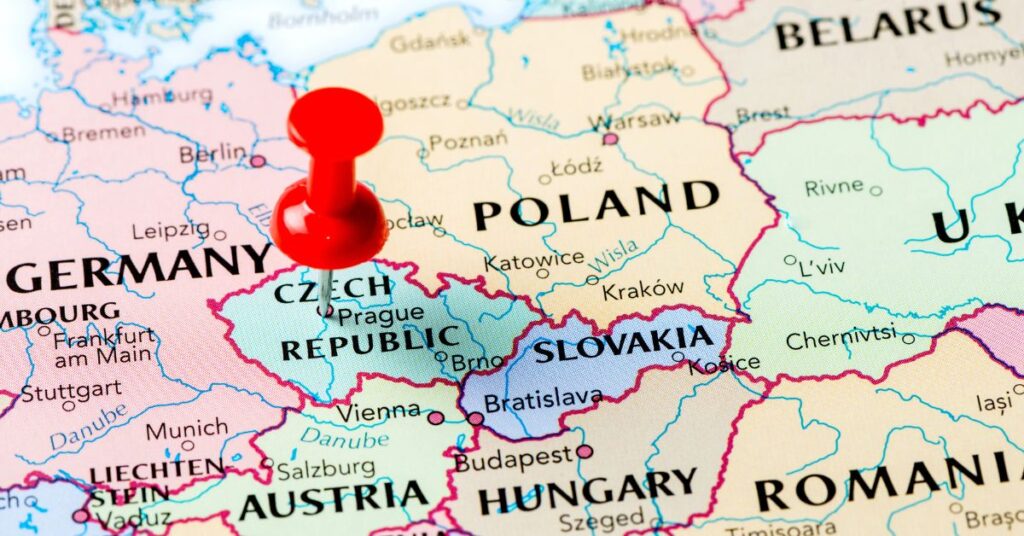The Czech Republic introduced its digital nomad visa in July 2023, offering an offbeat Central European destination to a select group of digital nomads. Included on the list of countries eligible to apply for the new digital nomad visa is the United States, meaning that moving to Prague or elsewhere in the Czech Republic just became a distinct possibility for qualified US citizens.
There is one catch though. The Czech Republic digital nomad visa is only available to workers in a certain industry: IT.
Below, we break down the requirements and application process for the Czech Republic digital nomad visa that IT professionals will need to adhere to in order to obtain the visa.
Snapshot of expat life in the Czech Republic
Population: 10.5 million
Capital city: Prague
Currency: Czech Koruna
Official language(s): Czech
Approximate number of American expats: Less than 10,000
Building on the Czech freelancer visa to introduce a visa for digital nomads
In the wake of the COVID-19 pandemic, countries worldwide have been launching digital nomad visas. With remote work booming, remote workers have become an attractive cohort of foreign residents for governments worldwide. In theory, making residency more accessible to foreigners whose spending will stimulate the economy without necessarily adding competition to the local job market.
While the Czech Republic already offers a freelance visa — also called the Zivno Visa — the new digital nomad visa is an exciting alternative for foreign remote workers hoping to move to the Czech Republic.
Unlike the Zivno Visa, the digital nomad visa is only open to applicants from one of eight countries and does not require you to be self-employed. Additional callouts include the monthly income requirement (as opposed to a savings requirement) and the explicit focus on attracting tech/IT/STEM workers.
Czech Republic digital nomad visa: Eligibility and requirements
Each country’s digital nomad visa has certain requirements relating to details such as work type and income level, and the Czech Republic digital nomad visa is no exception. Below is an overview of what to know about your eligibility, the visa’s duration, and other important notes.
Application eligibility
In order to be eligible for the Czech digital nomad visa, you must:
- Be a citizen of Australia, Canada, Japan, New Zealand, South Korea, Taiwan, the UK, or the USA
- Work remotely for more than three months in the Czech Republic as an employee of a foreign company or as a freelancer who holds (or will obtain) a Czech trade license
- Earn a monthly salary of at least 60,530 CZK (~$2,681 USD)
Visa duration
The Czech Republic Digital Nomad Visa is valid for up to one year. If the holder continues to be eligible and wants to renew the visa, they may apply to the Ministry of Industry and Trade of the Czech Republic for an extension. If granted, they may then apply for a long-term residence permit at their nearest Ministry of the Interior.1
Permitted activities and work restrictions
Holders of the Czech digital nomad visa can legally live in the country and work for non-Czech employers. A nomad’s close family members (spouses/registered partners, minor children, and dependents under 26 years old) can also apply.2
Czech Republic digital nomad visa application process
Applying for the Czech digital nomad visa will require you to email a completed application form and proof of education or at least three years of experience in an IT field to digitalnomad@mpo.cz. The additional required documentation depends on whether you are an employee or a freelancer.
Employees must include:3
- A document equivalent to an extract from the European Business Register proving the existence of a foreign employer
- An affidavit confirming that the foreign employer employs at least 50 employees worldwide
- A contract in English with key parts translated to Czech confirming that:
- Your salary meets the minimum monthly income requirement
- You will work for your employer remotely while in the Czech Republic
Freelancers must include:4
- Proof that you have registered with the relevant trade department for a license
- A contract with or affidavit from a client confirming that:
- Your work is in the IT field
- You will work remotely for your client(s) for the entire duration of your stay in the Czech Republic
- Your salary meets the minimum monthly income requirement
If approved, you will receive written confirmation and a recommendation for a visa from the Ministry of Industry and Trade (typically within five days), who will then inform the Ministry of Foreign Affairs and the Ministry of the Interior of their decision.
Over the course of the next two weeks, you will receive an email from your local Czech Embassy assigning you a date to come in person.
When you arrive for your appointment to apply for a residence permit for yourself (and any family members applying with you) you will also undergo an interview.
For each applicant, bring:5
- A valid passport
- A letter of purpose for your stay
- Proof of funds
- Proof of accommodation
- A passport-size photo
- Payment for the associated fee, typically 2,500 CZK (~$111 USD) for those aged 15+ and 1,000 CZK (~$44 USD) for those under 15
- A clean criminal record
- Proof of travel health insurance
If approved, you will receive a decision from the Department of Asylum and Migration Policy of the Ministry of the Interior (typically within 45 days) allowing you to enter the Czech Republic.
Within three days of your arrival, you must report your residence to your local police office.
Why become a digital nomad in the Czech Republic?
Although it may not be at the top of the average European travel bucket list, the Czech Republic is a favorite of many seasoned travelers.
Besides its famed tourist hotspots, Czechia’s reasonable cost of living, safe environment, and steady economy have enticed many regular visitors to become lifelong residents.
Affordability
The cost of living in the Czech Republic is significantly more affordable than in the US, considering that:6
- Consumer prices are about 31% lower
- Rent prices are about 59% lower
- Restaurant prices are about 53% lower
- Grocery prices are about 40% lower
Central European location

The Czech Republic’s central European location and its well-connected capital airport facilitate travel across the continent, extending beyond Eastern Bloc countries like Poland, Bulgaria, and Hungary. Other travel destinations include:
- Western European countries (e.g. Portugal, Germany, France)
- Mediterranean countries (e.g. Italy, Greece, Cyprus)
- Scandinavian countries (e.g. Norway, Finland, Sweden)
- Balkan countries (e.g. Croatia, Serbia, Albania)
- Countries in the British Isles (e.g. England, Ireland, Scotland)
- Middle Eastern countries (e.g. Turkey, Israel, Jordan)
- Northern African countries (e.g. Morocco, Egypt, Tunisia)
Close-knit digital nomad community
Even before the launch of the digital nomad visa, the Czech Republic was home to a blossoming community of digital nomads. These individuals came on the freelancer visa, attracted by the country’s affordability, central location, rich culture, and natural beauty.
As a result, today there are many digital nomad meetups, groups, coworking spaces, coliving spaces, cafés, and more.
Where to live in the Czech Republic
While the Czech Republic tends to be defined by its capital city, we’ve included a couple of cities in addition to Prague on the list below to give prospective digital nomads an idea of where to look beyond the famous capital.
Prague
The capital city of Prague is undoubtedly the biggest digital nomad hub in the Czech Republic (although there are other exciting places to live as well, which we’ll detail below!).
Due to its stunning Gothic, Romanesque, and Baroque architecture, Prague’s nickname is “the city of a thousand spires.”
Those living in Prague have access to a thriving cultural scene, with endless options for art, music, and museum lovers; a plethora of independent cafés known for their delicious coffee and eccentric atmospheres; and some of the best beer in the world.
Note: Digital nomads moving to Prague may want to check out the Adventurous Kate blog in particular, as the seasoned globetrotter ultimately decided to permanently settle there.
Brno
Although it’s the second-largest city in the Czech Republic, Brno has a much more tranquil feel than its larger counterpart, Prague. The city contains both a historic Old Town and a modern center, where you’re just as likely to find locals catching up over coffee on a centuries-old plaza as hitting up trendy bars and shops.
Olomouc
If you favor authentic, off-the-beaten-path locations, you’ll be hard-pressed to find a better destination in Czechia than Olomouc. This city has all of the architectural beauty, historical significance, and culture of Prague, with just a fraction of the tourists. Between its cobblestone streets, UNESCO World Heritage monuments, and hip university town vibe, you may never want to leave.
5 things that should be on your Czech Republic bucket list
There are more than enough sites and activities in the Czech Republic to keep you busy throughout the full year of your digital nomad visa (or even more if you choose to extend it!). But make sure not to miss out on these must-dos:
- Tour the Prague Castle, home of the current Czech president and a collection of breathtaking artifacts like 16th-century paintings, historical documents, and even the crown jewels
- Sample some freshly brewed beer at the Pivovar Plzeňský Prazdroj, better known as the Pilsner Urquel Brewery
- Stroll along the Charles Bridge — first built in 1357 — for unparalleled views of the Vltava river
- Relax in the soothing hot springs at one of the numerous spas in Karlovy Vary
- Get your nature fix at the Šumava National Park, where you can explore the Bohemian forest, mountains, and glacial lakes
Expat community in Czech Republic – how to find your people
It’s normal to feel unsure and even a little lonely when you move to a new country. Fortunately, the Czech Republic is bursting with opportunities to get out and meet new people — you’ll be making new friends in no time. A few ideas to get you started:
- Move into a co-living space
- Work from a coworking space
- Stay in a social hostel
- Take classes (e.g. learn how to make Czech beer, cooking, etc.)
- Attend events on Meetup & Couchsurfing
- Join local expat groups on Facebook
- Attend a language exchange
Moving to the Czech Republic
Before making the leap to becoming a digital nomad in the Czech Republic, make sure you cross the following off of your to-do list:
- Gather all of your important documents (passport, visa, etc.)
- Set up a doctor’s appointment to get any vaccines or medications you might need
- Buy tickets for your flights both into and out of the Czech Republic
- Book accommodations for your arrival
- Research what to bring, create a list, and pack your bags
- Flag your travel plans to your bank (or open a new account as needed) so they don’t mark purchases abroad as suspicious
- Set up a forwarding address for your mail, if necessary
- Connect with other digital nomads in the Czech Republic for advice on sites like Reddit or Facebook
Czech Republic digital nomad visa taxes
The Czech government classifies individuals who reside there for more than 183 days in a tax year as tax residents, making them subject to Czech taxes on their global personal income.
Fortunately, the Czech Republic’s personal income taxes are among the lowest in Europe,7 and there are a number of strategies Americans can employ to avoid double taxation (more on that below).
VAT in the Czech Republic
The Czech Republic’s value-added tax (VAT) — aka the tax placed on the sale of most goods and services in the Czech Republic — is generally 21%, although there are discounted rates available:8
- 15% VAT: Groceries
- 10% VAT: Certain medications, books, newspapers, heating/cooling, hotel accommodation, cultural events, etc.
Do American digital nomads in Czech Republic have to pay US taxes?
If you live in the Czech Republic as a digital nomad, you will be required to file a US tax return. However, it’s possible that you will not owe any taxes, so long as your US expat tax return is filed correctly.
Expat tax provisions for Americans filing US taxes in Czech Republic
Moving abroad may complicate your taxes and can feel overwhelming to navigate. Below are some of the additional reporting obligations tax breaks expats should read up on.
Foreign Earned Income Exclusion (FEIE)
The FEIE allows you to exclude a certain amount of foreign-earned income from taxation ($112,000 for tax year 2022, $120,000 for tax year 2023).
To be eligible, you need to pass either the Physical Presence Test or Bona Fide Residence Test. If you qualify, you’re also eligible for the Foreign Housing Exclusion/Deduction, which allows you to write off qualifying housing expenses like rent and utilities.
Foreign Tax Credit (FTC)
The Foreign Tax Credit (FTC) allows you to subtract what you pay in income taxes to a foreign government from what you owe the US government in income taxes.
Foreign Bank Account Report (FBAR)
The FBAR requires that you report your foreign bank accounts on an administrative form if you have $10,000 or more in your foreign bank accounts at any point in the year. This report is not sent to the IRS, but to the Financial Crimes Enforcement Network (FinCEN) via FinCEN Report 114.
Child Tax Credit (CTC)
If you have qualifying dependents living with you in the Czech Republic, you can file the Child Tax Credit (CTC) just as you would in the US to get as much as $2,000 in partially refundable credits.
Foreign Account Tax Compliance Act (FATCA)
If you have over $200,000 in foreign assets by the last day of the tax year, or over $300,000 in foreign assets at any point during the tax year, FATCA requires you to file Form 8938.
Digital Nomad in the Czech Republic - FAQ
-
Can an American move to the Czech Republic?
Yes! The Czech Republic’s recently launched digital nomad visa is open to applicants from just eight countries, one of which is the US — making it easier than ever for Americans to move there.
-
Does Prague have a digital nomad visa?
While Prague doesn’t have its own dedicated digital nomad visa, it is the capital city of the Czech Republic, which does have a digital nomad visa. So American digital nomads hoping to move to Prague would be able to do so under the Czech digital nomad visa.

 Connect on LinkedIn
Connect on LinkedIn





